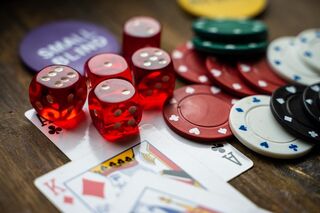Compulsive Behaviors
A Meaningful Life Includes Gambling for the Desired Outcome
We "gamble" to acquire limited resources: success, security, control, freedoms.
Posted October 21, 2021 Reviewed by Kaja Perina
Key points
- The way to achieve meaning and purpose in life is to (unfortunately) gamble on desired outcomes, but the true odds of success are unknown.
- Psychotherapy often deals with treating problems in living after a series of undesirable outcomes (gambles).
- To gamble is often confused with institutional monetary gambling, but we gamble with an unknown future never knowing the true odds of success.

Life is a gamble.
The word "gambling" usually refers to a game of chance; however, more generally, and related to mental health, we all gamble, making life decisions that may well never pan out. In a positive sense, we are "compulsive" about maintaining mental and biological integrity. This compulsivity is innate and learned.
Life paths contain unknown odds of a desirable outcome.
After high school, at age 18, you gamble on a life path: college, work, military. If you choose a college, you bet (risk) that the total expenses correlate over time to a better life, more contentment, and financial security, but nothing is certain.
And then you have a large student loan independent of outcome. Or if you enter the military, you risk injury or losing your life, trivial compared to a monetary loss playing a slot machine online or at a casino. Finally, if you begin employment after high school, you learn life is hard––low paying tedious work––and in hindsight, you should have taken high school more seriously.
Hypocrisy
People say one thing and do another. The people resisting taking the COVID-19 vaccine are gambling with their lives and infecting others, but if you asked them to play poker, they might say, "I don't gamble."
The stakes of life or death are higher than a full house in poker, but these dissonance thoughts fail to mentally compete. There is no cognitive dissonance if resisting the COVID-19 vaccine but later choosing to receive the annual flu shot. To a rational person, it makes no sense.
Formal education lowers risk-taking.
"Gambling" can be purely monetary but more often revolves around the educated choices we make day in and day out. I stress "educated" A role of formal education is to lower rational risk-taking. You have learned more about cause and effect. You know better.
Gambling, and its nuances, exist on a continuum: real-life decisions to a slot machine. Gambling is a recreation: board games and lottery games of chance particular to a culture. After the Industrial Revolution, people had more time on their hands for "games" to fill the time.
Sports and casino gaming have shot through the roof, given its (increasing) legality and online accessibility.
"Squid Game" makes no sense to many Western viewers.
The popular Netflix series "Squid Game" makes no sense to many non-Koreans. Western sensibility misses many abstract symbols and references, but its "message" is universal: the gap between the haves and have nots.
Inferred, life is a gamble to achieve sufficient wealth to live a safe and comfortable life. In "Squid Game," the stakes are higher: life and death, and children are the players, an unusual plotline, and for Western viewers bordering on a taboo.
Participation in sports and casino gaming have shot through the roof, given its (increasing) legality and online accessibility.
Formalized games of change are in many ways fairer (you know what you are getting into) than ambiguous non-monetized outcomes in real life: hence the massive appeal.
My game is blackjack. I know the true odds and the house odds. The "house" makes money by the difference. Here is how it works: The following two sentences seem odd. I win; they win. I lose; they win. Great business model. The "house" wins when I win since the payoff is always less than the true odds.
In all forms of gambling, nothing is for sure. In Atlantic City, half the casinos went bankrupt through poor management. The casino's "gamble" is the money volume per unit time. An empty casino floor does not cut it, so there are "comps" to get warm bodies playing and free alcohol for players lowering critical reasoning making stupid bets.
The psychology of a recreational gambler.
My goal as a recreational gambler is to have a lucky streak and walk away. I assign a monetary value to the duration of the gambling experience, like a roller-coaster ride. If I played blackjack for two hours and lost $100, it was worth it as the cost of having fun.
This reasoning is not a rationalization for losing but the fair value (a popular term in behavioral economics) for my time for two hours of "getting away from it all" in "Lah-Lah land." Plus, having taught game theory, I know how game theory determines the outcomes based on probability, statistics, and money management.
What is a problem gambler?
Life decisions are not so clear-cut, so if you are in a tedious job, you can't get up and "walk away from the table." When the perceived value (an individual difference based on station in life) exceeds gambling losses by definition, you are a "problem gambler" defined by the DSM-V.
Gambling and life.
Another way to think about gambling is to take a risky action, a "bet on the future" in the hope of a desired result. In a sense, this is living your life. Every day, we all gamble with our future linked to accessing limited resources, satisfaction, maintaining emotional relationships, career advancement, health and lifestyle choices, starting a new business. Some great ideas pay off, and other great ideas fall flat.
Therapy includes treating clients whose "gambles" did not pay off.
I treat many problems in living with clients whose gambles did not pay off emotionally, for example, treating a divorcing couple. Divorce has more significant life consequences than losing $100 playing recreational blackjack. Who you meet and marry is a gamble.
Understanding gambling in full requires formal knowledge across many disciplines, including mathematics.
Understanding risky choices in search of desirable outcomes include many scientific fields: psychology, behavioral economics, space travel, neuro-economics, learning theory, statistics and probability, game theory, computer programming, AI, mathematics, biological evolution, and neuroscience.
Our understanding of risk-taking is complicated and mathematical. For example, NASA "gambled" on the 135 Space Shuttle missions. A retrospective risk analysis by the Space Shuttle Safety and Mission Assurance Office found that the first nine shuttle flights had a 1 in 9 chance of catastrophic failure.
In psychology, and this is no revelation, there are failures and setbacks along the way to succeed in life. Ask any successful entrepreneur who risked it all on the "next" business.
Why do we gamble?
The question is, why do we gamble? If you rethink "gambling" as simply a choice with an unknown outcome, this is living our life. A casino simply institutionalizes this predisposition for risk-taking, assigning a known value to the result. And monetary gambling is non-discriminatory, unlike racism in real life. In the gambling world, the only color is green.
People gamble in life, in casinos, online for the action, the rush, the thrill to win money, socialize, be stimulated, escape from social and mental health problems causing (in some) substance abuse, obsessive-compulsive disorders, and depression after a significant loss. That is, the outcome was highly undesirable given substantial stakes.
Gambling and mental health.
If you are a problem gambler, the formal diagnosis is "impulse control disorder." A significant monetary loss or inability to stop (self-discipline) is a "problem gambler" that leads to despondency and helplessness. This makes problem gambling addiction. The low payoffs are less than the actual value of what you can financially and psychologically afford to lose.
I once watched a younger gentleman at a high roller roulette table (inside bets up to $25,000) cover the table with $500 chips and always lose. I was dumbfounded, and so as he as his two-foot-high stack of $500 chips (about $100K) went to zero. He has a problem ( I assume) will when he gets home.
Gambling can be fun when the stakes are low.
To be fair, gambling provides spice to life, but it is easy to become addicted after a significant win or loss. A large win (success) means you suddenly believe in easy money and that people are suckers who earn a living. A considerable loss means you have to chase a win to just break even.
If too many life choices culminate in undesirable outcomes, you must change. Therapy is one possible process to achieve constructive changes quickly, to avoid pitfalls since suffering emerges from loss and self-defeating behaviors. If all paths are dead ends, seek advice now. Take the gamble.
References
Diagnostic And Statistical Manual of Mental Disorders, Fifth Edition. (2013) American Psychiatric Association. Washington, D.C.
Griffiths, M. (1990) The Cognitive Psychology of Gambling. Journal of Gambling Studies. Vol. 6 (1), Spring. Human Sciences Press. New York.
Flatow, I. (2011) Early Space Shuttle Flights Riskier Than Estimated. NPR Radio March 4, 2011.




